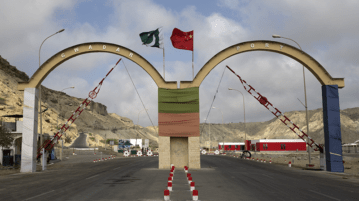Is it in the Chinese interest to ignore security concerns?
China and Pakistan’s diplomatic history is littered with notable agreements and incidents. People-to-people communication was also launched with zeal, but now Balochistan’s ethnic-nationalist terrorist organizations are targeting Chinese nationals and interests.
The Balochistan Liberation Army (BLA) is one of the province’s most active ethnic-nationalist terrorist organizations, fighting for greater regional autonomy for Balochistan against the Pakistani government. It is one of the most vicious militant organizations in the world, targeting ethnic Punjabis, Hazaras, Sindhis, and even Chinese nationals working for Balochistan’s development.
For a long time, BLA has been involved in inhumane acts and has targeted innocent people such as engineers, teachers, social activists, and administrators. Militants have often threatened, bombed, or otherwise assaulted schools, resulting in injuries, fatalities, property damage, and a reduction in educational opportunities for Baloch children and teenagers.
Many teachers, mainly ethnic Punjabis and Shiite Muslims, as well as other targeted minorities and increasingly Chinese nationals, have requested leave or transfers out of fear for their safety, further burdening Pakistan’s already strained educational system. BLA’s recent terrorist strike at Karachi University, which killed three Chinese nationals, is another example of their heartless mentality.
BLA claimed in an online statement that the suicide attack at the University of Karachi was carried out “to send a clear message to China that its direct or indirect involvement in Balochistan would not be accepted.” According to some commentators, the BLA’s use of suicide bombs, as well as the inclusion of women in them, is a relatively new tactic for the organization.
Apart from the BLA, several other ethnic-nationalist and religious terrorist organizations in Pakistan have sought to assault Chinese nationals and interests. Last year, Nong Rong, the Chinese Ambassador to Pakistan, narrowly avoided a Tehrik-i-Taliban Pakistan targeted explosion in a Quetta hotel (TTP). Two Chinese people were kidnapped in Quetta in June 2017 and were eventually released.
This trend, I believe, will continue in the coming years as China invests economically in Pakistan and explores deeper security cooperation, posing a direct threat to the United States, which has retreated from Afghanistan and created a dangerous security environment in the area. Pakistan would never be in a good position in India’s eyes. Indeed, some foreign organizations are funding BLA and TTP-style extremist groups in Pakistan that are waging war on China.
Pakistan is one of the most enthusiastic members of China’s ambitious foreign policy initiative, the Belt and Road Initiative (BRI), which includes the China Pakistan Economic Corridor (CPEC). It’s more about developing the connection between China and Pakistan.
Infrastructure, energy, education, and security are among the long-term development initiatives offered by CPEC. The two nations agreed to expand defence cooperation between the Chinese People’s Liberation Army and the Pakistani military in 2020. Both nations agreed to step up counter-terrorism cooperation in 2021. However, the rising assassination of Chinese people in Pakistan has generated security worries in China.
The continued targeting of Chinese people and interests in Pakistan would heighten concerns about Chinese participation and human security dangers in the country. The Chinese Communist Party currently enjoys trust and understanding with Pakistan, as well as expanding economic and security connections, but how long can this be sustained?
Without a doubt, the partnership between China and Pakistan has long been a source of embarrassment for India and, more recently, the United States. Both have made a concerted effort to sabotage the two all-weather allies’ economic and security relationship. CPEC has fuelled the fire, particularly in India. As a result, it is attempting to disrupt CPEC by harmful operations and by creating plots to destabilize Pakistan using all possible methods, including through its proxies in Balochistan.
According to Pakistani evidence, the Balochistan Liberation Army (BLA), Balochistan Liberation Front (BLF), Balochistan Republican Army (BRA), and Lashkar-e-Balochistan are among the Indian proxies in Balochistan. These extremists have close ties to India’s RAW and National Directorate of Security, and their goal is to sabotage Sino-Pak relations.
Foreign meddling in Balochistan is justified because of the country’s geostrategic and geoeconomic importance. The construction of Gwadar port is altering the dynamics of regional and worldwide powers’ political and geoeconomic contexts. To defend their interests, they are doing all they can to hinder the development of Gwadar port (Balochistan).
No one can dispute that improving China-Pakistan relations aids Beijing’s geopolitical and geoeconomic objectives in the area, which may extend beyond bolstering its historic alliance with Pakistan against India, which is obvious to everybody. This understanding is built on a win-win situation, with no intermediaries or proxies.
As a country, we must recognize that China is a friend, not a foe. It is usual for any state to carry its interests if Beijing has a strong interest in Pakistan or the region. We may readily comprehend China’s aims and development plans if we compare them to the United States. It’s time to stand alongside our all-weather buddy and face our adversaries.








